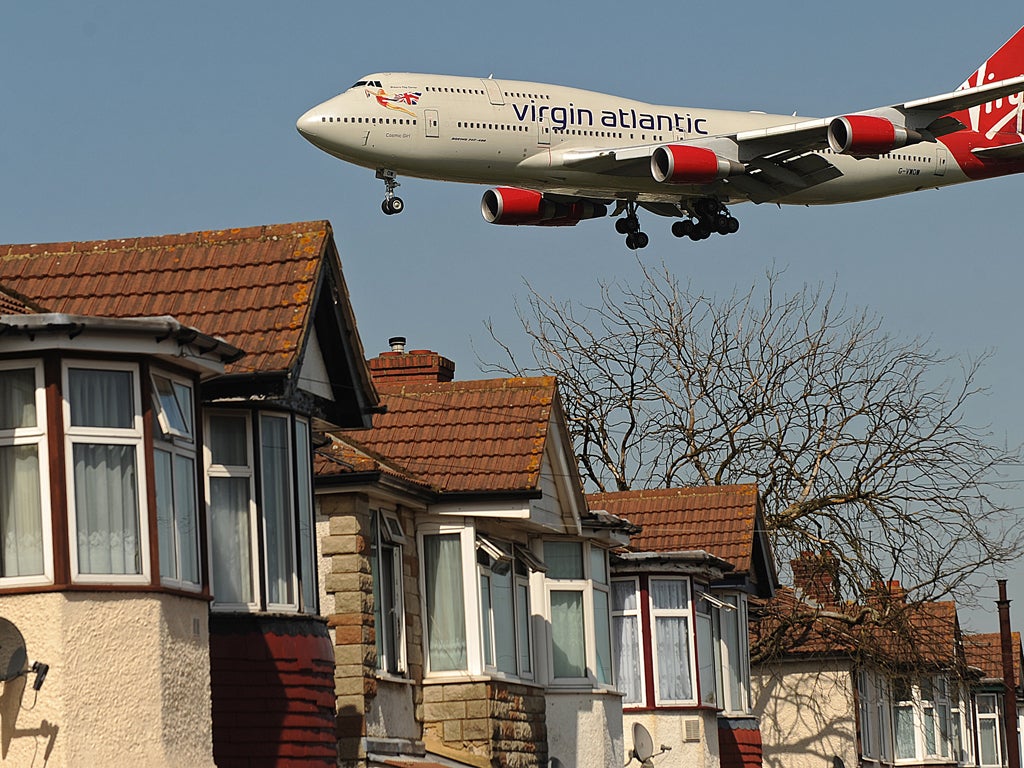I've lived under the flight path to Heathrow much too long to doubt the damage air pollution can do
Our writer has written at length about aircraft noise in the past. Here she reflects on a recent study on the subject. Below: the fuss over sexist front pages


We pay more attention, I would wager, to arguments we like than to those we don’t. Which is doubtless why I was so taken with reports of research saying that building a third runway at Heathrow could treble deaths related to air pollution (bringing them to 150 a year by 2030), while a brand new “Boris Island” airport could reduce them by two thirds. Of course, I’d hardly given the time of day to a report, just a couple of weeks before, projecting the huge cost of transport links to a new airport – money that would come out of our taxes!
As you may know, I have a bee in my un-soundproofed bonnet about aircraft noise. In common with thousands of central Londoners, I’m awoken before 5am several times a week, as flights muster over the Thames, queuing to land at Heathrow. Why the flightpath tracks the Thames through the very centre of town defeats me; many cities ban overflights on security grounds alone. It especially annoys me when people say that those living near airports know what they are getting. Central London is not Hounslow or Richmond.
But there was another reason why the report – by researchers at MIT and Cambridge University – tweaked my interest. A few months before, I’d tried to find out whether anyone had compared “normal” air pollution levels in London with the level when volcanic ash grounded all the planes in the spring of 2010. I had the impression at the time that those days were uniquely clear; that I didn’t need to wash my hair so often; that general grime levels were lower. Were there figures to prove it?
I was put in touch with a team at University College London. They regretted that they had no answer. Air quality is only monitored, apparently, in the immediate vicinity of the airport, and any recorded difference had been negligible.
But now there seems to be an answer, if only a partial one, that at least chimes with common sense. The MIT/Cambridge study found that the wind mostly blows from north-east to south-west, so that pollution from Heathrow disproportionately affects the whole of London. I can imagine politicians and planners whispering that an extra 100 deaths a year is not so many in the greater scheme of things (though they would never say that for the record). But is air quality for the rest of us not an issue? And if it isn’t, perhaps it should be.
The bylines are all at home
A bit of a fuss this week over the dearth of women’s bylines on the front pages of major newspapers, the conclusion – drawn by the group, Women in Journalism - being that newspapers are run by and for men. I’ve no doubt men’s bylines predominate on the front page, as almost everywhere else in newspapers, except perhaps in fashion and beauty - come on, lads, where are you? I also know, don’t we all? that a hot-line to an editor can push an article up the pecking order.
But a big story is a big story, and there is a more basic explanation for the current lack of women’s bylines on the front page: the sad truth is that they are not hugely in evidence elsewhere either. Indeed, it seems to me that there are fewer female political reporters and fewer female foreign correspondents than there were when I was reporting through the late 1980s and 1990s. This may be partly because cost cutting has claimed staff correspondents’ jobs, but partly, too, because news – which is, after all, the staple of front pages – is hard to constrain within family-friendly hours.
More men than you might think also forsake news reporting for family reasons, but family responsibilities are as incompatible with front-page deadlines as they always were. You’ll find the women in broadcasting, on the web, and writing books. But so long as newspapers go to press in late evening for delivery in the morning, it’s in the home that you’ll find the answer to the lack of female front-page bylines.
m.dejevsky@independent.co.uk

Join our commenting forum
Join thought-provoking conversations, follow other Independent readers and see their replies